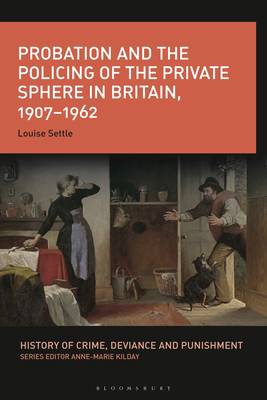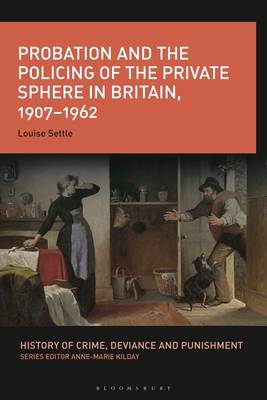
- Retrait gratuit dans votre magasin Club
- 7.000.000 titres dans notre catalogue
- Payer en toute sécurité
- Toujours un magasin près de chez vous
- Retrait gratuit dans votre magasin Club
- 7.000.0000 titres dans notre catalogue
- Payer en toute sécurité
- Toujours un magasin près de chez vous
Probation and the Policing of the Private Sphere in Britain, 1907-1962
Louise Settle
67,95 €
+ 135 points
Description
In 1907 the Probation of Offenders Act introduced a system which allowed offenders to be rehabilitated at home under supervision, rather than being sent to prison. This book explores how the probation system was used to regulate the private lives, emotions and behaviours of people in Britain between 1907 and 1962.
Access to the private sphere, both physically and psychologically, meant that the probation system was particularly well-suited to offences related to intimate and personal relations. With each chapter focusing on a particular type of offence, including wife assault, attempted suicide, male sexual offences and female prostitution, Settle shows how experiences of the probationers were shaped by the everyday practices of probation, and assesses the extent to which probation was successful in rehabilitating offenders and protecting the public. Also examining the role of probation officers in marriage reconciliation, the book explores how ideas about gender and domesticity were crucial to both the process of rehabilitation and the endeavour to make the home a safe environment in which these domestic ideals could come into fruition. Probation and Policing of the Private Sphere in Britain enriches our understanding of the role of the state in policing, monitoring and promoting the well-being of its citizens, and explores the nuances of probation's dual purpose as a form of social control as well as a social work service designed to help the most vulnerable in society.
Access to the private sphere, both physically and psychologically, meant that the probation system was particularly well-suited to offences related to intimate and personal relations. With each chapter focusing on a particular type of offence, including wife assault, attempted suicide, male sexual offences and female prostitution, Settle shows how experiences of the probationers were shaped by the everyday practices of probation, and assesses the extent to which probation was successful in rehabilitating offenders and protecting the public. Also examining the role of probation officers in marriage reconciliation, the book explores how ideas about gender and domesticity were crucial to both the process of rehabilitation and the endeavour to make the home a safe environment in which these domestic ideals could come into fruition. Probation and Policing of the Private Sphere in Britain enriches our understanding of the role of the state in policing, monitoring and promoting the well-being of its citizens, and explores the nuances of probation's dual purpose as a form of social control as well as a social work service designed to help the most vulnerable in society.
Spécifications
Parties prenantes
- Auteur(s) :
- Editeur:
Contenu
- Nombre de pages :
- 256
- Langue:
- Anglais
- Collection :
Caractéristiques
- EAN:
- 9781350233485
- Date de parution :
- 27-07-23
- Format:
- Livre broché
- Format numérique:
- Trade paperback (VS)
- Dimensions :
- 156 mm x 234 mm
- Poids :
- 362 g

Les avis
Nous publions uniquement les avis qui respectent les conditions requises. Consultez nos conditions pour les avis.






